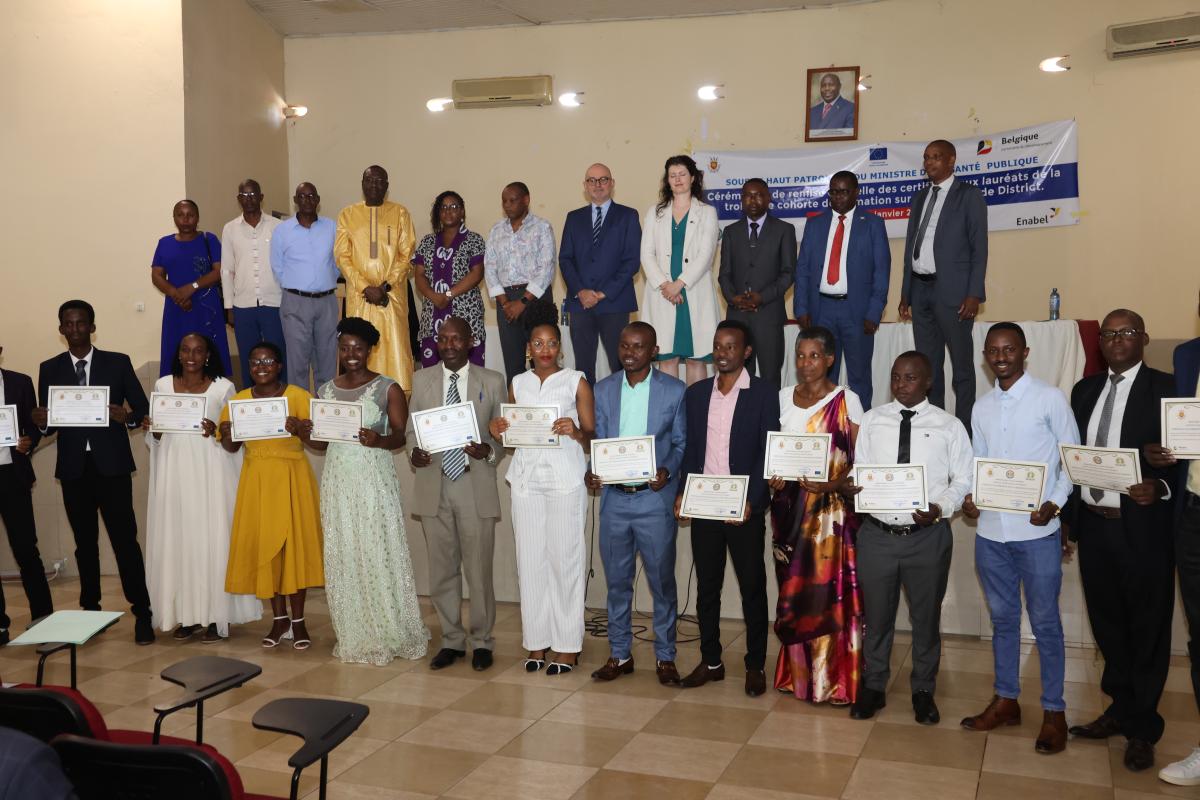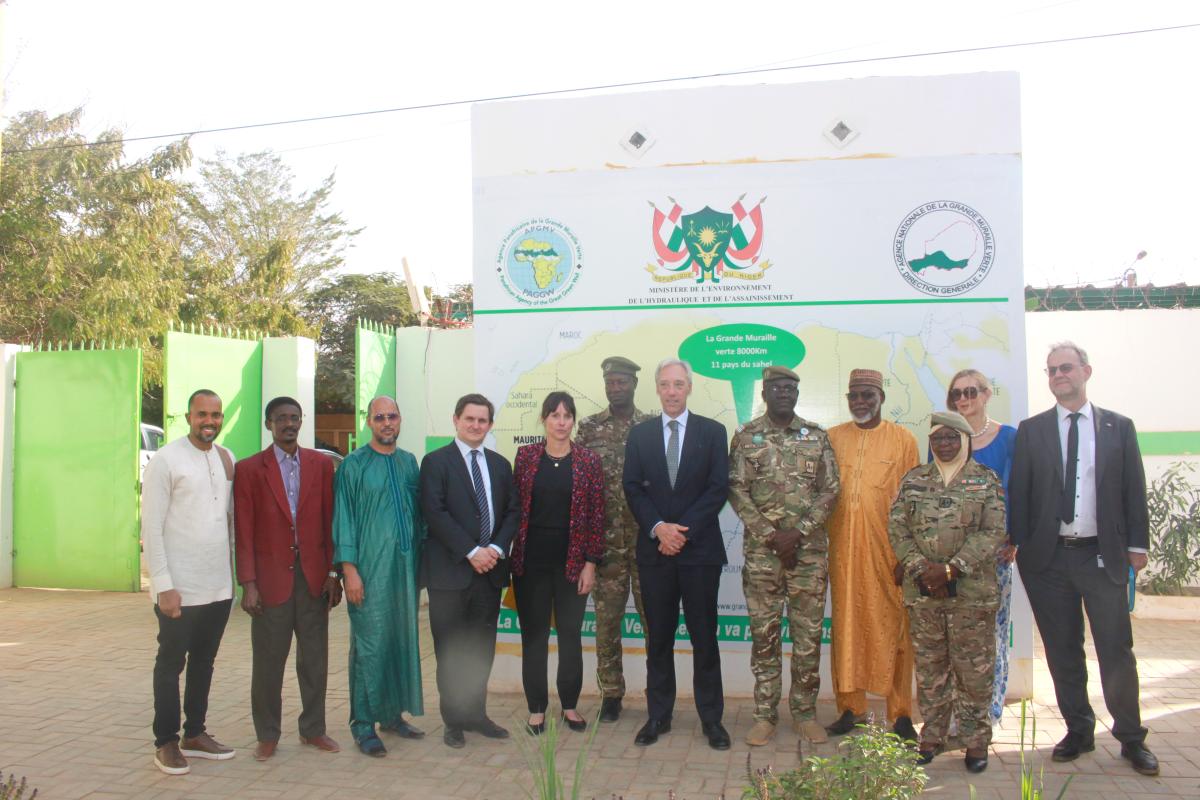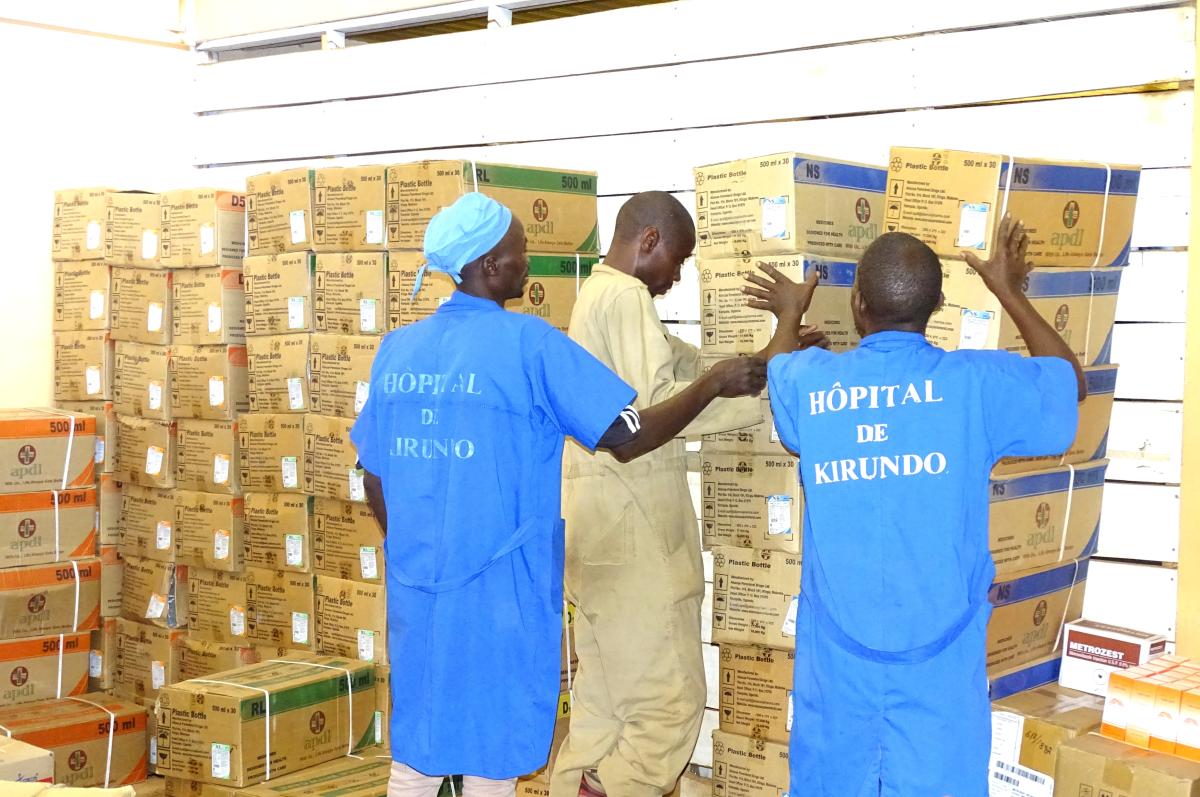Opzoeken
15 - 30 van 3120 nieuws bekijken
-
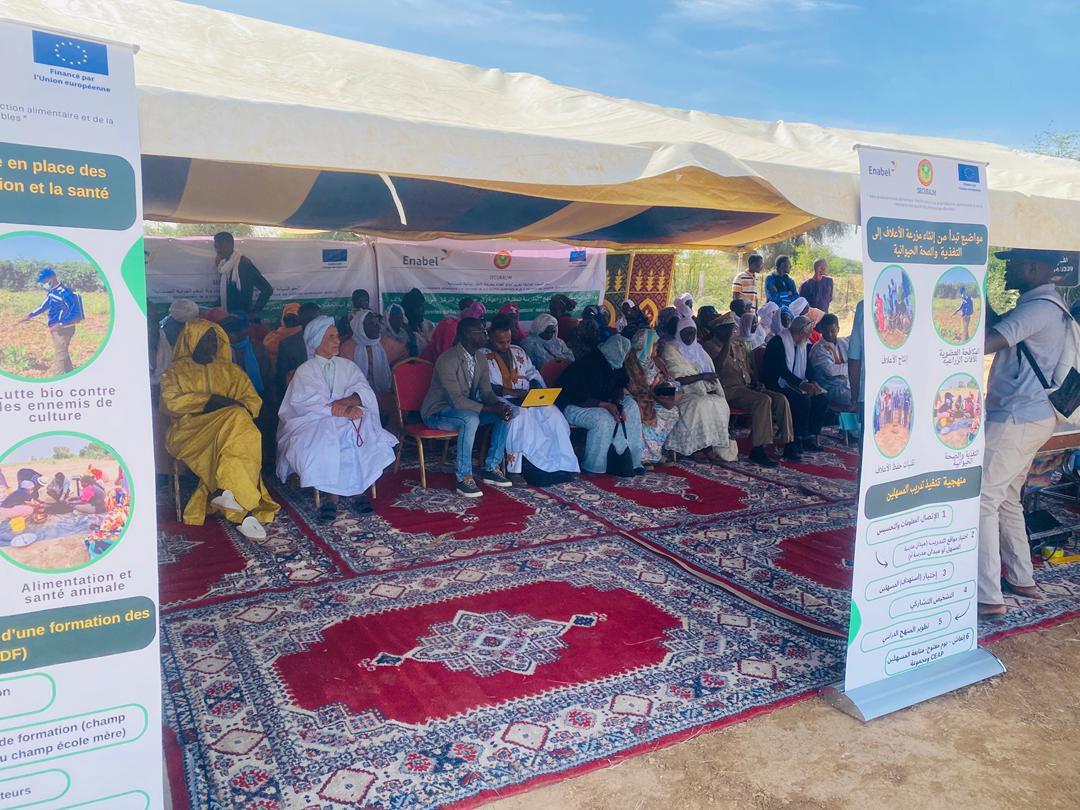
Cultiver l’avenir en Mauritanie : le Champ-École au cœur de la résilience pastorale
Aminata KANE | 02/02/2026
L’innovation agropastorale franchit une nouvelle étape en Mauritanie. Ce jeudi 22 janvier 2026, la localité de Garack (Rosso) a vibré au rythme de la journée portes-ouvertes de l’approche Champ-École Agropastoral (CEAP). Cet événement marquait la fin d'un cycle intensif de 4 mois pour la 3ᵉ cohorte de facilitateurs fourragers : 27 producteurs passionnés, venus des régions Sud, désormais prêts à transformer les pratiques locales.Pourquoi l’approche CEAP change la donne ?Contrairement à une formation classique, le CEAP repose sur « l'apprentissage par la pratique ». Pendant quatre mois, les apprenants ont expérimenté, observé et analysé les meilleures techniques de production fourragère directement sur le terrain.Un dialogue multi-acteurs pour demainAutorités administratives, élus locaux, services techniques et acteurs de terrain se sont réunis pour (1) toucher du doigt les résultats concrets obtenus dans les champs-écoles, (2) échanger sur les acquis techniques et organisationnels et, (3) tracer les pistes de diffusion pour que cette expertise bénéficie au plus grand nombre.« Le développement agropastoral inclusif n'est plus une ambition, c'est une dynamique en marche. » Ce succès est le fruit d’un engagement fort des partenaires qui ont réaffirmé leur soutien pour pérenniser ces acquis et renforcer la sécurité alimentaire dans la région.Le projet SECURALIM pour la souveraineté alimentaire en Mauritanie ambitionne de renforcer durablement la production nationale et la résilience des systèmes alimentaires. Il mise sur la professionnalisation des exploitations agropastorales et l’amélioration de leur performance économique afin d’assurer un approvisionnement régulier des centres urbains en produits de qualité, accessibles à l’ensemble de la population mauritanienne. Il est financé par l'Union européenne et mis en œuvre par Enabel, en étroite collaboration avec les partenaires locaux.
-
Des professionnel·les mieux formé·es pour améliorer l’accès à la chirurgie de district au Burundi
Jean BIRONKWA | 29/01/2026
Le ministère de la Santé Publique (MSP), via l'Institut National de Santé Publique (INSP), a officiellement certifié une nouvelle promotion de 48 professionnels de la santé. Ce renforcement des capacités vise à rapprocher les soins chirurgicaux de la population et à réduire les transferts vers la capitale. Cette promotion se compose de profils complémentaires prêts à opérer en équipe dans un bloc opératoire. Il s'agit de 18 médecins généralistes, 15 infirmiers de bloc opératoire et 15 techniciens anesthésistes. Pour développer les compétences nécessaires aux réalités du terrain, ces lauréats ont suivi une formation intensive de sept mois (1 mois de formation théorique ; 5 mois de pratique intensive et 1 mois de coaching direct en milieu professionnel). Désormais déployés dans 18 hôpitaux de district, ils assurent la prise en charge d'interventions essentielles (complications obstétricales, traumatismes, urgences abdominales et interventions urologiques) qui, auparavant, nécessitaient un transfert coûteux vers Bujumbura. L'impact de cette initiative est double. Pour les patients des zones reculées, c'est la garantie d'un accès rapide à des soins de qualité. Pour les structures de santé, c'est un levier de croissance. Les équipes formées participent au renforcement de l'autonomie des hôpitaux de district et contribuent ainsi à améliorer les recettes hospitalières grâce à la réalisation de nouveaux actes chirurgicaux sur place. Ce programme bénéficie du soutien de la Belgique et de l'Union européenne à travers respectivement les projets NTUSIGARINYUMA et UE-PASS-FBP3 AMAGARA MU MURYANGO mis en œuvre par Enabel. Ces partenaires ont réaffirmé au cours de ces cérémonies leur engagement à contribuer à l'amélioration de la qualité des soins dans les hôpitaux les plus reculés du Burundi. Depuis 2022, cet effort conjoint a déjà permis de trois anciennes promotions de 65 équipes. Les résultats sont tangibles en termes d'amélioration des plateaux techniques et de boost des compétences des ressources humaines disponibles. Les hôpitaux de district ont déjà réalisé environ 29 800 interventions chirurgicales, transformant durablement le paysage sanitaire du Burundi.
-
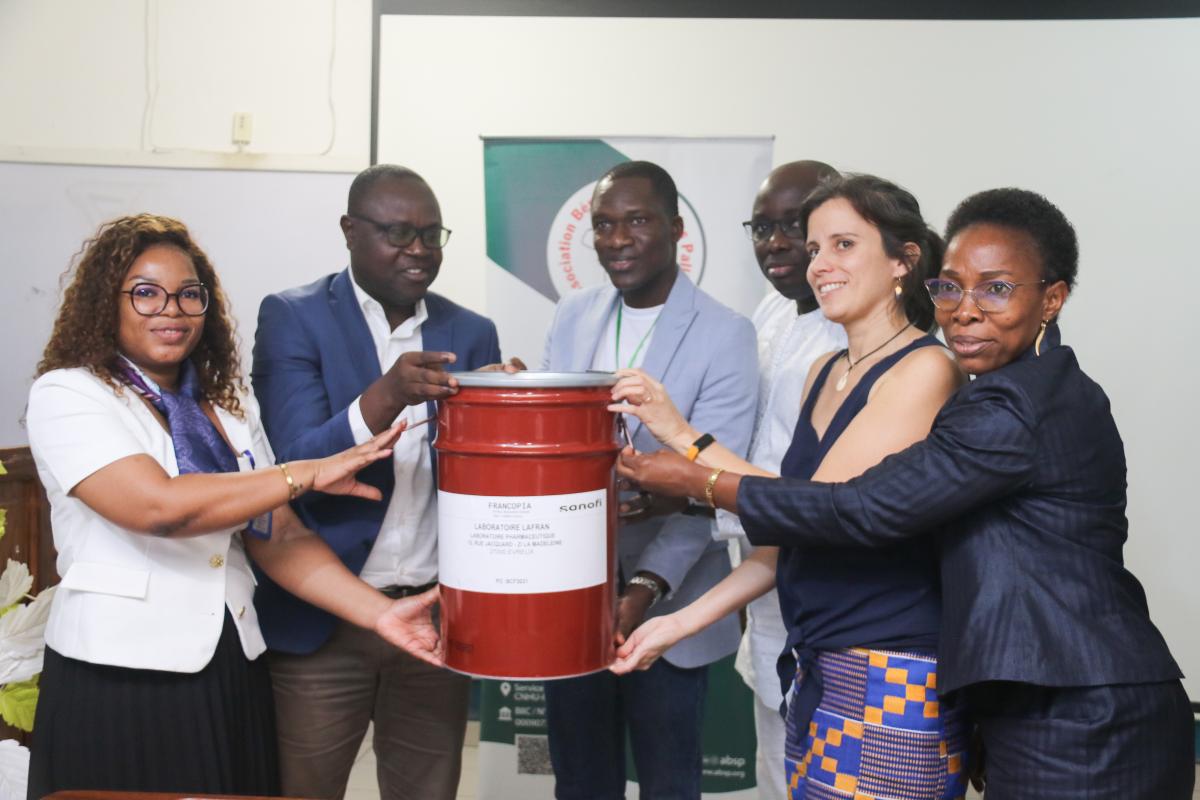
Soulager la douleur, préserver la dignité : un engagement concret en faveur des soins palliatifs au Bénin
Reece-hermine ADANWENON | 27/01/2026
Cotonou, 27 janvier 2026 Dans un contexte où l’accès effectif à la prise en charge de la douleur demeure un enjeu majeur de santé publique, Enabel a procédé à la remise de 5 kg de morphine en poudre au CNHU-HKM, au profit du Programme National des Soins Palliatifs (PNSP). Cette dotation vise à répondre à un besoin immédiat et critique, tout en consolidant durablement la prise en charge de la douleur dans les structures sanitaires du pays.Une réponse essentielle à un enjeu de dignité humaine Lors de la cérémonie de remise, le Directeur Général du CNHU-HKM a rappelé avec force une réalité encore trop souvent vécue par les patients : « ce n’est pas normal qu’en 2026, même si nous sommes en vie, que les agents de santé nous laissent subir les douleurs. » Cette déclaration souligne l’urgence d’agir pour garantir un accès effectif aux soins palliatifs, considérés aujourd’hui comme un droit fondamental des patients, et un marqueur clé de la qualité des systèmes de santé. Un appui structurant au bénéfice de tout le territoire La dotation de morphine en poudre permettra notamment : d’assurer la continuité des soins palliatifs dans les structures sanitaires ; de renforcer la disponibilité des opioïdes essentiels pour la prise en charge de la douleur ; de soutenir la production locale de solution orale de morphine au CNHU-HKM. Cette production locale permettra d’approvisionner l’ensemble du Programme National des Soins Palliatifs, garantissant ainsi une couverture élargie et équitable au profit des patients sur toute l’étendue du territoire national. Un partenariat inscrit dans la durée Depuis plusieurs années, Enabel accompagne le PNSP à travers une approche intégrée combinant dotations en médicaments et équipements, renforcement des capacités des professionnels de santé, soutien institutionnel et déploiement d’unités de soins palliatifs dans plusieurs départements. Cet engagement s’inscrit dans une vision commune avec le Ministère de la Santé : réduire les souffrances évitables et placer la dignité humaine au cœur des politiques de santé. Soulager la douleur n’est pas un luxe. C’est une exigence éthique, sanitaire et humaine. À travers cet appui, Enabel réaffirme sa conviction que chaque patient mérite une prise en charge respectueuse, jusqu’au dernier instant, et que les soins palliatifs constituent un pilier essentiel d’un système de santé juste, inclusif et performant.
-
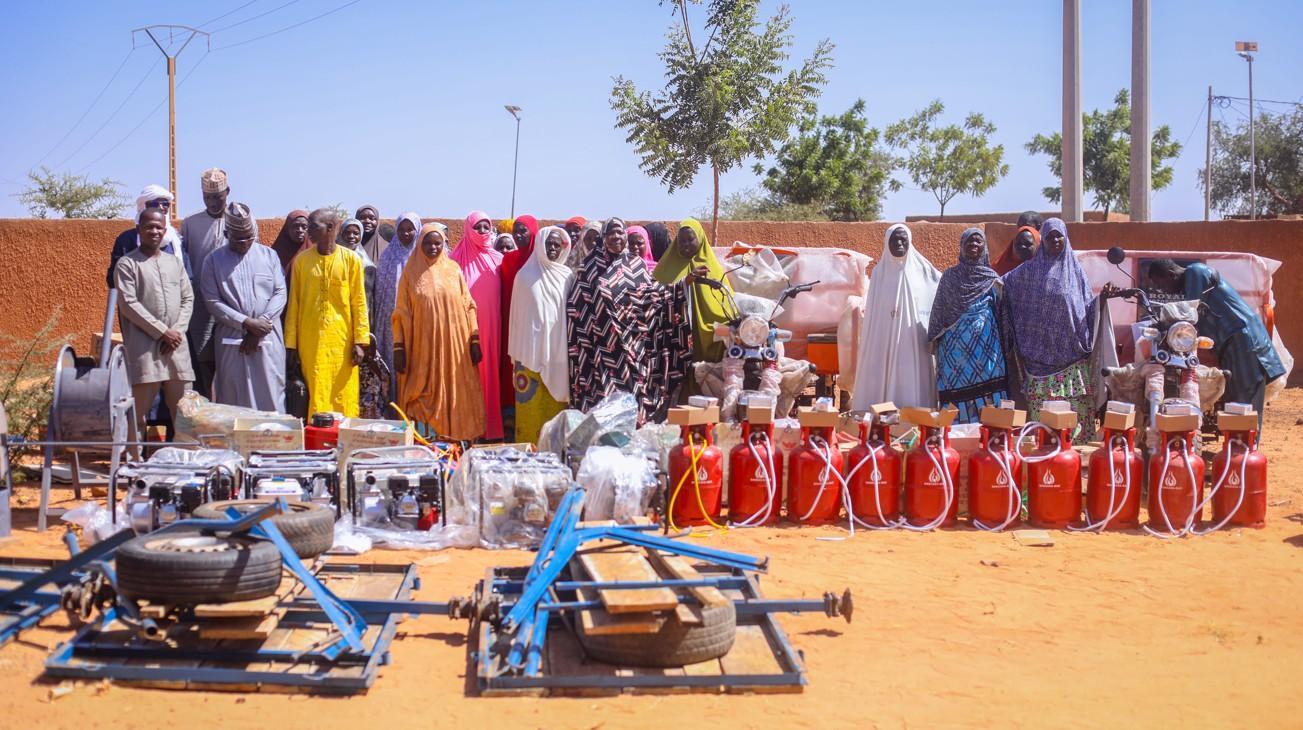
Production, transformation, autonomie : les coopératives du Niger montent en puissance
Halissa HASSAN DAN AZOUMI | 27/01/2026
Dans le cadre du projet ASYPON/GMV, financé par l’Union européenne et mis en œuvre par Enabel, des cérémonies officielles de remise de kits de production et de transformation ont été organisées au profit des Sociétés Coopératives (SCOOPS) appuyées dans plusieurs communes de la région de Tillabéri. Ce projet, inscrit dans le programme Nexus Trois Frontières dans la région de Tillabéri a pour objectif de renforcer la résilience des populations vulnérables, en particulier les femmes et les jeunes, à travers la relance d’une vie économique inclusive et durable, en cohérence avec les objectifs de la Grande Muraille Verte. Les kits remis comprennent notamment des motopompes, tricycles, charrettes asines, équipements de transformation (décortiqueuses, extracteurs d’huile, torréfacteurs, broyeurs) destinés à améliorer la production, la transformation et la commercialisation des produits agro-sylvo-pastoraux.Les autorités administratives et les partenaires ont salué cette initiative, soulignant son impact sur le renforcement de la résilience et de l’autosuffisance alimentaire des communautés. Pour les bénéficiaires, cet appui arrive à point nommé. « Ce matériel vient alléger nos difficultés. Avant, nous entendions seulement parler de ces machines, aujourd’hui elles sont à nous. Grâce à cet appui, nos conditions de travail vont s’améliorer et nos activités vont se développer », témoigne une membre d’une coopérative bénéficiaire. À travers cette action, Enabel réaffirme son engagement à soutenir l’autonomisation économique des femmes, le développement local et la gestion durable des ressources naturelles au profit des communautés de la zone des Trois Frontières.
-
Quand l’échange fait la différence : des résultats qui renforcent la résilience des communautés au Niger
Halissa HASSAN DAN AZOUMI | 27/01/2026
Ce mardi 19 janvier, le Représentant spécial de l’Union européenne pour le Sahel, en visite au Niger, a rencontré la Directrice pays d’Enabel, le Directeur général de l’Agence Nationale de la Grande Muraille Verte (ANGMV) ainsi que l’équipe du projet ASYPON/GMV. Financé par l’Union européenne et mis en œuvre par Enabel en partenariat avec l’ANGMV, le projet contribue au renforcement de la résilience des communautés à travers des actions concrètes sur le terrain. Cette rencontre a permis de présenter les principaux résultats obtenus, illustrés par une projection vidéo et une exposition photo mettant en lumière l’impact des activités réalisées au bénéfice des populations et des écosystèmes.
-

Au Niger, la jeunesse au cœur de la transformation des collèges ruraux
Halissa HASSAN DAN AZOUMI | 27/01/2026
L’éducation, un droit fondamental encore inégal. L’éducation est un droit humain fondamental et un levier essentiel du développement, conformément à l’Objectif de Développement Durable n°4. Au Niger, l’accès à une éducation inclusive et de qualité reste un défi majeur, en particulier pour les filles. L’éloignement des écoles, les mariages précoces, la pauvreté et le manque d’infrastructures scolaires adaptées favorisent les inégalités et les abandons scolaires.Le projet Sarraounia 2 : des collèges transformés en « écoles centres de vie » Face à ces défis, le projet Sarraounia 2, mis en œuvre par Enabel en partenariat avec les ministères en charge de l’Éducation et de la Protection, agit dans la région de Dosso. Il transforme les collèges ruraux en véritables écoles centres de vie, où l’apprentissage dépasse le cadre de la salle de classe.La jeunesse, actrice de la co-création de l’éducation Placée sous le thème « Le pouvoir de la jeunesse dans la co-création de l’éducation », la Journée internationale de l’éducation 2026 met en lumière une approche au cœur de Sarraounia 2 : les élèves sont des acteurs et actrices du changement, aux côtés des enseignants, des parents et des communautés.Promouvoir l’égalité filles-garçons à l’école Le projet encourage l’égalité entre les filles et les garçons grâce à des clubs mixtes d’écoute et de dialogue. Les élèves y apprennent à connaître leurs droits, à identifier les violences et à devenir des alliés contre le harcèlement, les discriminations et les mariages précoces.Le numérique et la solidarité pour lutter contre le décrochage Sarraounia 2 renforce l’accès au numérique avec des salles informatiques connectées, permettant notamment la production du bulletin scolaire Sarraounia Info. Le mentorat entre élèves favorise la solidarité, l’entraide et la réussite collective, contribuant à prévenir le décrochage scolaire.Des activités extrascolaires pour une école plus attractive Sport, jardinage, reboisement, élevage ou activités génératrices de revenus dynamisent la vie scolaire et renforcent l’ancrage de l’école dans sa communauté.Construire une école plus juste, équitable et inclusive En plaçant la jeunesse au cœur de l’action, Sarraounia 2 contribue à bâtir une école équitable, protectrice et inclusive, où filles et garçons participent pleinement à la construction de leur avenir.
-
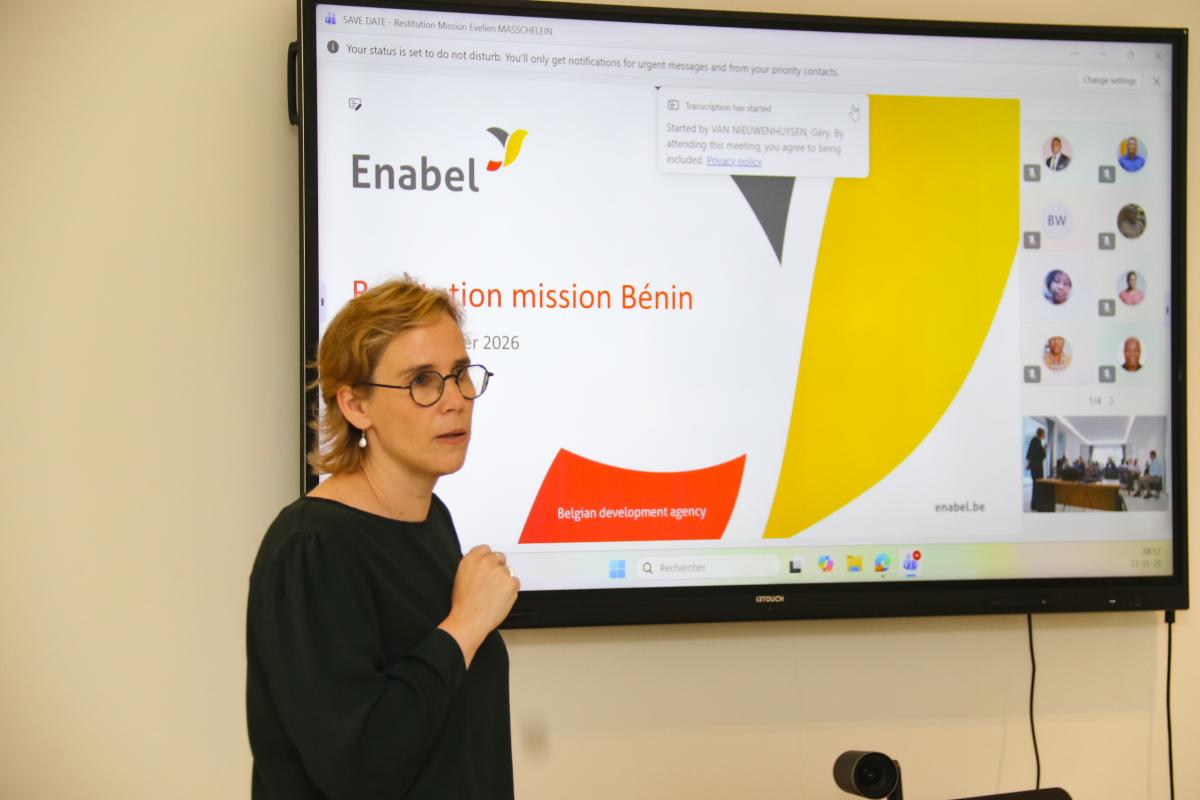
Enabel au Bénin se projette vers 2035 : une vision stratégique, partenariale et innovante
Reece-hermine ADANWENON | 26/01/2026
Du 19 au 23 janvier 2026, Enabel au Bénin a accueilli une mission de Bruxelles composée de Alizée du Bus de Warnaffe (experte Innovation) et Evelien Masschelein (Directrice Expertise & Think). Objectif : rencontrer les parties prenantes, analyser les dynamiques des programmes et co-construire une projection ambitieuse pour les 5 à 10 prochaines années, à l’horizon 2035. Une semaine de terrain pour nourrir une ambition long terme Pendant cinq jours, la mission a multiplié les échanges avec les équipes projets, les services d’appui et les partenaires afin de : mieux saisir le contexte national et les opportunités à venir, identifier les forces et défis par pilier, enrichir la réflexion locale par des éléments “corporate”, partager les orientations de la nouvelle politique de formulation des projets, marquée par un renforcement de la phase d’identification et une recherche de focus stratégique dès les premières étapes. Un atelier clé : “quelle agence sera Enabel au Bénin en 2035 ?” Le 22 janvier, le Management Board, les Project Managers et les experts thématiques ont mené un exercice de projection stratégique visant à définir ce que sera Enabel au Bénin en 2035, et comment l’agence opérera dans le pays. La réflexion s’est structurée autour de trois axes : le quoi : thématiques, secteurs, populations prioritaires le qui : type de services rendus au Bénin en 2035 le comment : instruments, partenariats, modalités d’action et financements Cet exercice s’inscrit dans une ambition : faire évoluer la posture d’Enabel, d’une logique principalement d’implémentation vers une agence davantage stratégique, partenaire de premier choix du Bénin et catalyseur d’investissements, avec une ouverture accrue sur les dynamiques régionales. Des discours qui donnent le cap Lors de l’ouverture, Olivier Krins, Directeur de Enabel au Bénin, a souligné la nécessité d’anticiper et d’oser : "Nous ne parlons pas d’utopie. Nous parlons de vision... et l’importance de “prendre la dynamique" plutôt que de subir le changement. Jean Van Wetter, Directeur Général de Enabel (message vidéo), a partagé une projection 2035 où Enabel au Bénin doit être un partenaire stratégique de premier rang : diversification des instruments (“New Ventures”), mobilisation de partenariats publics et privés, souplesse programmatique, et transition vers une gestion par objectifs plutôt que par activités. Du côté national, M. Serge Dossou-Yovo, Directeur Général du Financement du Développement au Ministère de l’Économie et des Finances, a rappelé un tournant majeur : après une décennie d’investissements structurants, la priorité devient la qualité, l’efficacité et l’impact équitable, en mettant l’accent sur le capital humain, la formation, l’emploi et la structuration de chaînes de valeur inclusives. « Nous sommes entrés dans une phase de structuration, de montée en qualité et de transformation systémique. » Innovation : augmenter l’impact, rester pertinent Le 23 janvier, une restitution à l’ensemble du personnel a permis de partager les enseignements de la mission. Alizée du Bus de Warnaffe a rappelé une définition simple et exigeante : « L’innovation est une solution nouvelle qui a le potentiel d’augmenter l’impact par rapport aux approches existantes. » Au Bénin, l’innovation a été reconnue comme déjà présente : pragmatique, utile, ancrée dans le quotidien des projets, et portée par une équipe qui teste, apprend et capitalise. Points saillants et perspectives Le retour de mission a mis en évidence : un programme structuré autour de quatre piliers porteurs d’opportunités, des partenariats solides et d’autres à explorer (notamment au niveau régional), l’importance de la capitalisation d’expériences (innovation, économie bleue, plateformes digitales, police communautaire, corridor…), une dynamique d’équipe marquée par l’appétit d’expérimentation, et un potentiel à renforcer sur les profils transversaux, la mutualisation et la collaboration inter-équipes. Cette mission marque une étape importante : penser la vision 2035 dès maintenant pour renforcer notre pertinence, diversifier nos instruments, consolider nos partenariats et accroître l’impact au service du Bénin. Une dynamique portée collectivement et impulsée par un leadership qui mise sur l’anticipation, la stratégie et l’innovation.
-
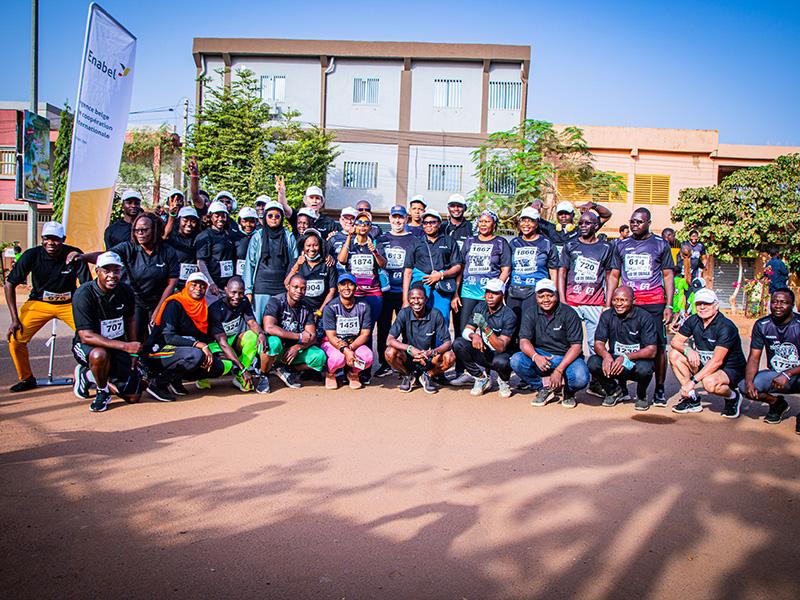
Enabel et la Team Belgium : le sport pour renforcer la cohésion au Burkina Faso
Wendpouiré Julien NANA | 22/01/2026
Enabel et la Team Belgium à la Xe édition du « 10 km de Ouaga » : le sport au service de la cohésion et de l’esprit d’équipeLe dimanche 18 janvier 2025, Enabel au Burkina Faso, l’Ambassade de Belgique ainsi que des ACNG belges, réunies sous la bannière de la Team Belgium ont pris part à la Xe édition anniversaire du « 10 km de Ouaga », un événement sportif de référence organisé par le Centre sportif Jean SIMPORÉ. Le départ de la course a été donné aux environs de 9h, depuis le site du Centre sportif SIMPORÉ à Ouagadougou, réunissant de nombreux athlètes, amateurs de course à pied, ainsi que des institutions et organisations autour des valeurs de dépassement de soi, de solidarité et de convivialité.Une participation collective et engagéeComme lors des éditions précédentes, la Team Belgium a marqué cette édition par une mobilisation active, inclusive et fortement incarnée. Aux côtés des collaborateur·rice·s, le Directeur pays d’Enabel, Danny Denolf, et l’Ambassadeur de Belgique, Erwin De Wandel, ont pris part à l’activité, illustrant par leur présence leur engagement envers les valeurs de cohésion et de proximité avec les équipes.Coureurs, accompagnateurs et soutiens se sont mobilisés dans un esprit d’équipe, faisant de cette activité bien plus qu’une simple compétition sportive. Au-delà de la performance individuelle, cette participation visait avant tout à promouvoir le bien-être, la cohésion interne et l’esprit d’équipe, des valeurs chères à nos institutions. La présence conjointe des équipes d’Enabel, de l’Ambassade de Belgique et de certaines autres ACNG belges a renforcé la dynamique de collaboration, de solidarité et de convivialité au sein de la Team Belgium.Un esprit d’équipe valorisé à l’arrivéeÀ l’issue de la course, la Team Belgium a célébré l’engagement de ses participant·e·s lors d’une brève cérémonie de reconnaissance. Le classement interne a été dominé par Haguibou DEM et Mamadou KONÉ (Enabel), suivis de l’Ambassadeur de Belgique, Erwin De Wandel et de NOORDHOLLAND DE JONG Jozef (Enabel). Alima NADIOUBA s’est distinguée comme première femme d’Enabel à franchir la ligne.Plusieurs distinctions ont également été remises : Tatiana SEBOGO (Enabel) a reçu le prix de la plus jeune participante ; Monique TRAORÉ et Sonia SONGNABA (Ambassade de Belgique) celui des meilleures finalistes ; tandis que Danny DENOLF et Juliette NAGALO (Enabel) ont été honoré·e·s du Prix Booster pour leur rôle mobilisateurCes distinctions symboliques traduisent la volonté de valoriser l’effort collectif, la persévérance, et l’esprit d’équipe.Le sport, un levier de bien-être et de valeurs partagéesEn participant à cette Xe édition anniversaire du 10 km de Ouaga, Enabel et la Team Belgium réaffirment leur attachement aux initiatives promouvant la santé, la cohésion sociale et le vivre-ensemble. Ces moments sportifs et conviviaux renforcent les liens humains et contribue à un environnement de travail sain, motivant et solidaire.
-
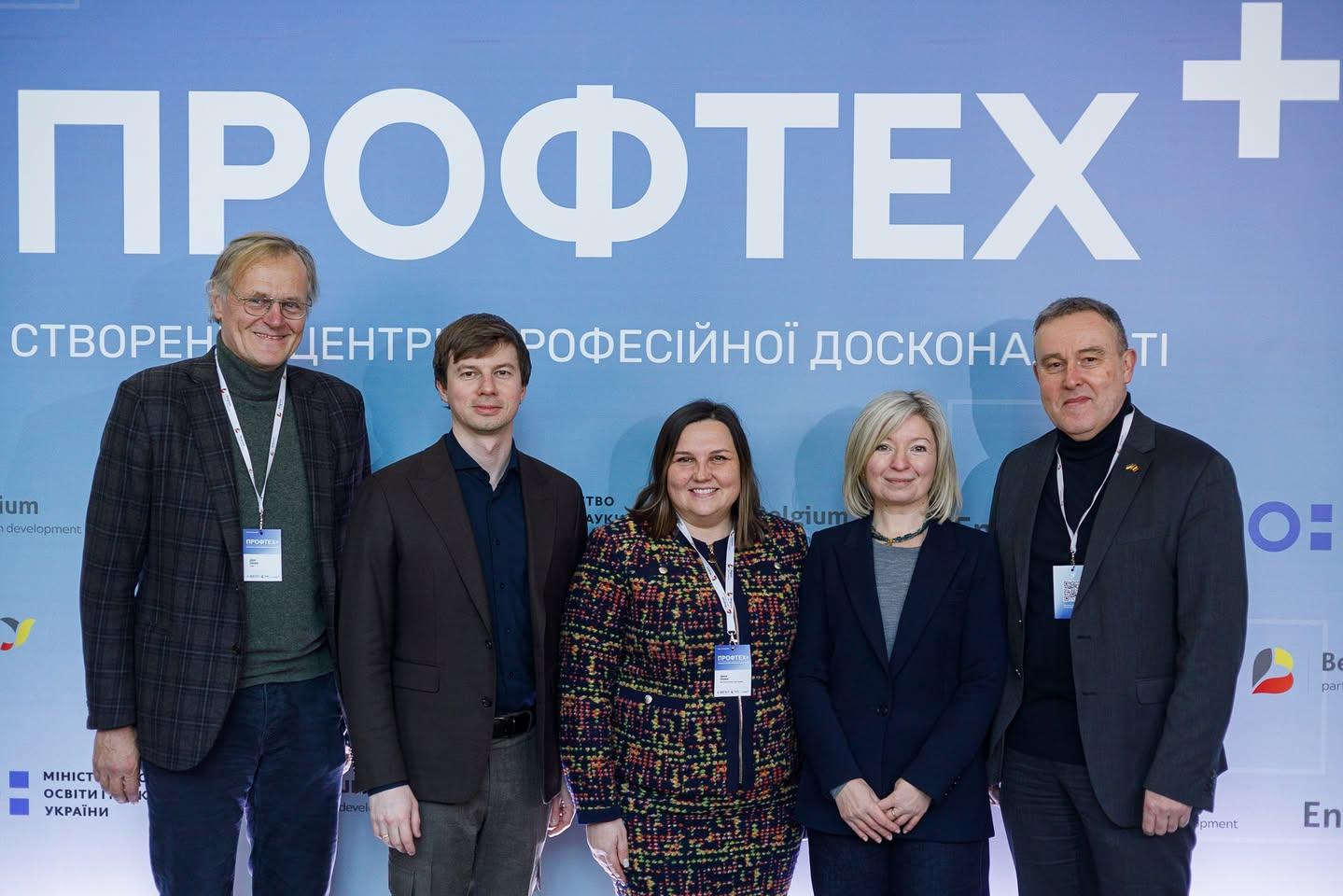
Ukraine: Enabel co-hosts a strategic session on CoVEs with the Ministry of Education
Taisiia DRUZIUK | 21/01/2026
On 16 January, Enabel and the Ministry of Education and Science of Ukraine hosted the VET+ strategic session. The event brought together educators from 12 regions alongside representatives from regional education departments to develop a shared vision for transforming vocational schools into centres of vocational excellence. Through group brainstorming sessions, participants tackled several key questions: – What sets a centre of excellence apart from a strong vocational college?– What are the pros and cons of different CoVE models?– Where do you start when preparing to launch a CoVE, and what resources are needed beyond state-of-the-art infrastructure?Opening remarks came from Luc Jacobs, Ambassador of Belgium to Ukraine, Dmytro Zavhorodnii, Deputy Minister of Education and Science, Dirk Deprez, Enabel Country Director, and Iwona Ganko, Senior Expert at the European Training Foundation leading the Ukraine Task Force.The session was facilitated by Iryna Shumyk, Director General for Vocational Education at the Ministry of Education, and Enabel expert Oleksandra Borodiyenko. Enabel is supporting the Ministry of Education and Science in the rollout of centres of excellence across Ukraine. Together with the ETF, we are developing a major programme to introduce vocational education leaders to the CoVE approach and its practical tools.
-
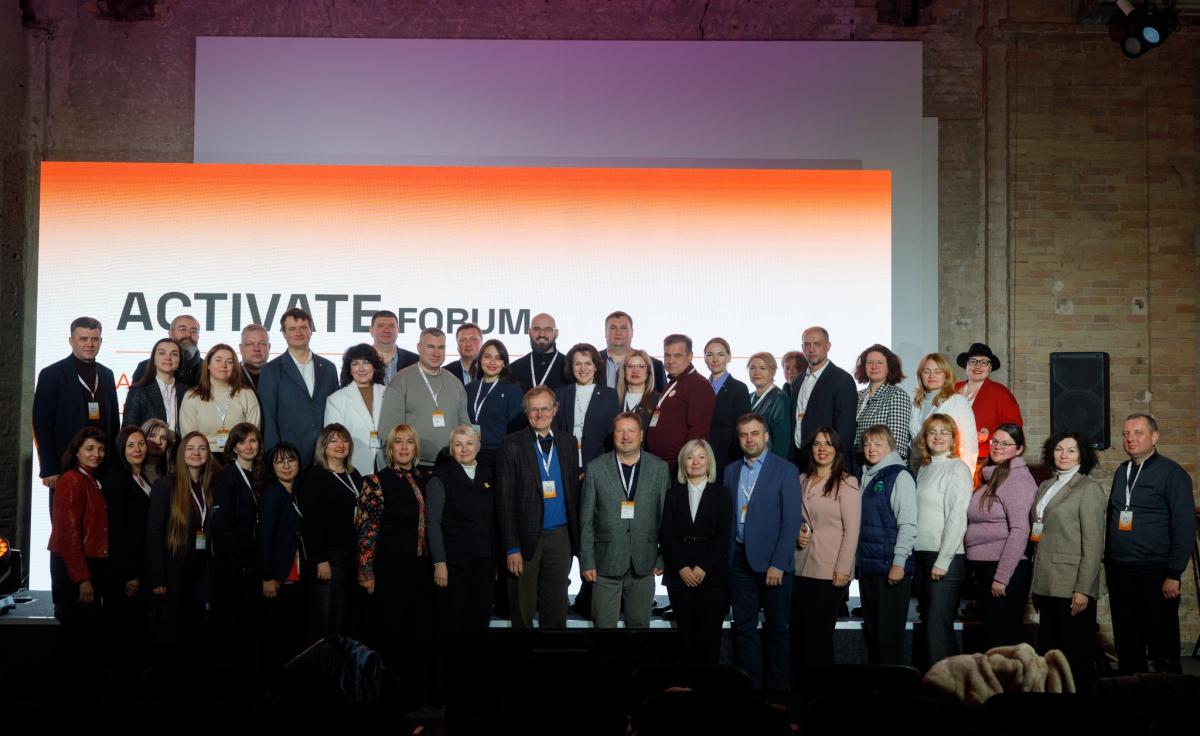
Ukraine: Enabel hosts an event on active labour market policies
Taisiia DRUZIUK | 21/01/2026
On 15 January, Enabel hosted the ACTIVATE Forum, an event on active labour market policies and pathways to their implementation. The forum brought together partners to mark the completion of the first phase of our ALMP Facility grant programme and the launch of its second call, Jobs for the Future. The event featured remarks from Luc Jacobs, Ambassador of Belgium to Ukraine; Daria Marchak, Deputy Minister of Economy, Environment and Agriculture of Ukraine; and Henrik Huitfeldt, Head of Section for Public Finance, Business Support, and Social Policies at the EU Delegation to Ukraine.Regional economic strategy perspectives were presented by Zhanna Osypenko, Deputy Head of the Kyiv Regional Military Administration, and Zhanna Sherstiuk, Deputy Head of the Chernihiv Regional Military Administration. Dirk Deprez, Enabel Country Director: "Active labour market policies are not just about economic indicators – they are first and foremost about people. Helping people find jobs, return to the labour market, or gain new skills is essential for sustainable recovery." Nine finalists of Enabel's ALMP Facility grant programme presented projects aimed at activating the labour markets in the Chernihiv and Kyiv regions. Career support for veterans, short-term training courses in the construction sector, and training for electricians restoring critical infrastructure – these and other initiatives will soon be implemented with Belgium’s support. Oleksandra Borodiyenko, Enabel expert: "The finalists demonstrated a deep understanding of the dynamics of regional labour markets and within specific communities. All selected projects offer a comprehensive approach to supporting people – from training or retraining to employment with partner companies."
-
Burundi : mieux soigner grâce à un accès renforcé aux médicaments de qualité
Jean BIRONKWA | 20/01/2026
Le Programme AMAGARA MU MURYANGOappuie l'ABREMA pour un meilleur accès aux médicaments de qualité.La qualité et l'accessibilité des produits pharmaceutiques en santé constituent un des piliers essentiels pour garantir des soins de santé efficaces et équitables à la population. Au Burundi, ce secteur stratégique fait face à plusieurs défis, notamment en matière de gestion logistique, de disponibilité des données et de régulation des médicaments. Enabel, à travers le Programme d'appui au système de santé (UE-PASS FBP 3) « AMAGARA MU MURYANGO » financé par l'Union européenne, apporte un appui stratégique et technique à l'ABREMA (Autorité burundaise de régulation des médicaments à usage humain et des aliments), afin de renforcer la gouvernance et l'efficacité du secteur pharmaceutique du pays. La gestion des médicaments au Burundi souffre notamment d'une insuffisance de centralisation et d'harmonisation des données d'information logistique à tous les niveaux du système de santé. Cette situation complique l'identification rapide des médicaments les plus essentiels, l'anticipation des besoins entraînant ainsi des ruptures fréquentes de stocks au détriment des patients. Pour répondre à ces défis, l'appui du UE-PASS FBP3 à l'ABREMA s'est articulé autour de plusieurs actions concrètes. Un total de 357 gestionnaires de pharmacie issus de 15 districts sanitaires, ont notamment d'une formation axée sur le Système de Gestion et d'Information Logistique (SGIL). Cette initiative visait à renforcer leurs capacités et à préparer l'introduction prochaine de l'eLMIS Medexis, un logiciel moderne de gestion électronique des médicaments. L'adoption de cet outil représente une avancée majeure vers une meilleure traçabilité, une planification plus efficace et une optimisation durable des stocks. Le Programme AMAGARA MU MURYANGO a également accompagné l'ABREMA dans la validation des documents stratégiques, notamment la finalisation des textes réglementaires relatifs à l'assurance qualité des produits de santé. Par ailleurs, un Manuel de procédures administratives, financières et comptables a été validé. Ce document constitue un levier fondamental pour instaurer une gouvernance institutionnelle transparente, efficace et conforme aux normes de bonne gestion au sein de l'ABREMA. En complément, un appui matériel substantiel a été apporté, notamment l'acquisition d'équipements informatiques modernes. Ce soutien logistique contribue à renforcer les capacités opérationnelles de l'ABREMA et à améliorer son rôle de régulation du secteur pharmaceutique.
-
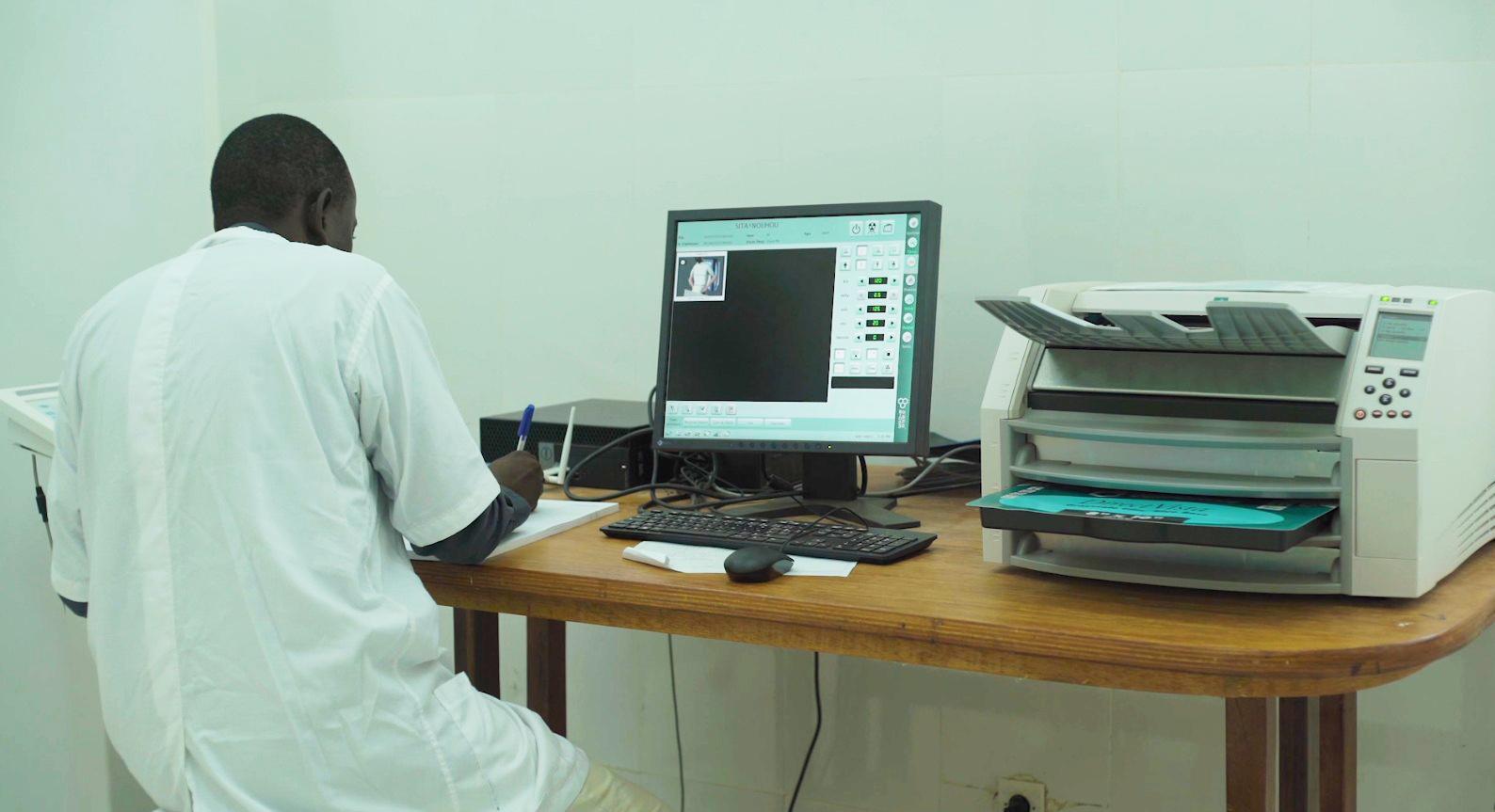
La digitalisation des hôpitaux améliore les soins au Niger
Halissa HASSAN DAN AZOUMI | 20/01/2026
Ce jeudi 15 janvier 2026, un atelier de capitalisation sur le système d’information hospitalier (SIH) s’est tenu à Niamey. Cette rencontre s’inscrivait dans le cadre du projet d’Appui au Système de Santé PASS Sutura, financé par la Belgique et mis en œuvre par Enabel, ainsi que du projet de lutte contre le paludisme (Paludisme GF), financé par la Fondation Gates et également exécuté par Enabel. L’atelier a réuni l’ensemble des parties prenantes impliquées dans la mise en œuvre des projets, notamment les équipes d’Enabel, les représentants du niveau central du système de santé, ainsi que les responsables des hôpitaux et des Centres de Santé Intégrés (CSI).La mise en place du Système d’Information Hospitalier OpenClinic GA dans plusieurs formations sanitaires marque une avancée importante pour le système de santé. Appuyée par Enabel et ses partenaires, cette initiative vise à améliorer la gestion des hôpitaux, le suivi des patients et la qualité des soins.Déployé dans dix hôpitaux et centres de santé à Gaya, Gothèye, Dosso, Doutchi, Boboye et Dioundiou, le système permet de centraliser les dossiers des patients, la facturation, la pharmacie, le laboratoire et les statistiques sanitaires. Les agents de santé disposent ainsi d’informations fiables, accessibles et mieux organisées.Grâce à la digitalisation et à l’installation d’équipements durables (énergie solaire, réseaux informatiques, assistance à distance), les résultats sont déjà visibles. Les responsables des formations sanitaires indiquent une hausse significative des recettes, parfois multipliées par deux à quatre, ainsi qu’une meilleure traçabilité des soins et des prestations.En capitalisant sur ces résultats encourageants, l’expérience du SIH démontre que la santé numérique constitue une solution pertinente et adaptée au contexte nigérien. Elle ouvre ainsi des perspectives prometteuses pour une extension progressive du système à l’échelle nationale, au service d’un système de santé plus performant, transparent et centré sur les patients.
-
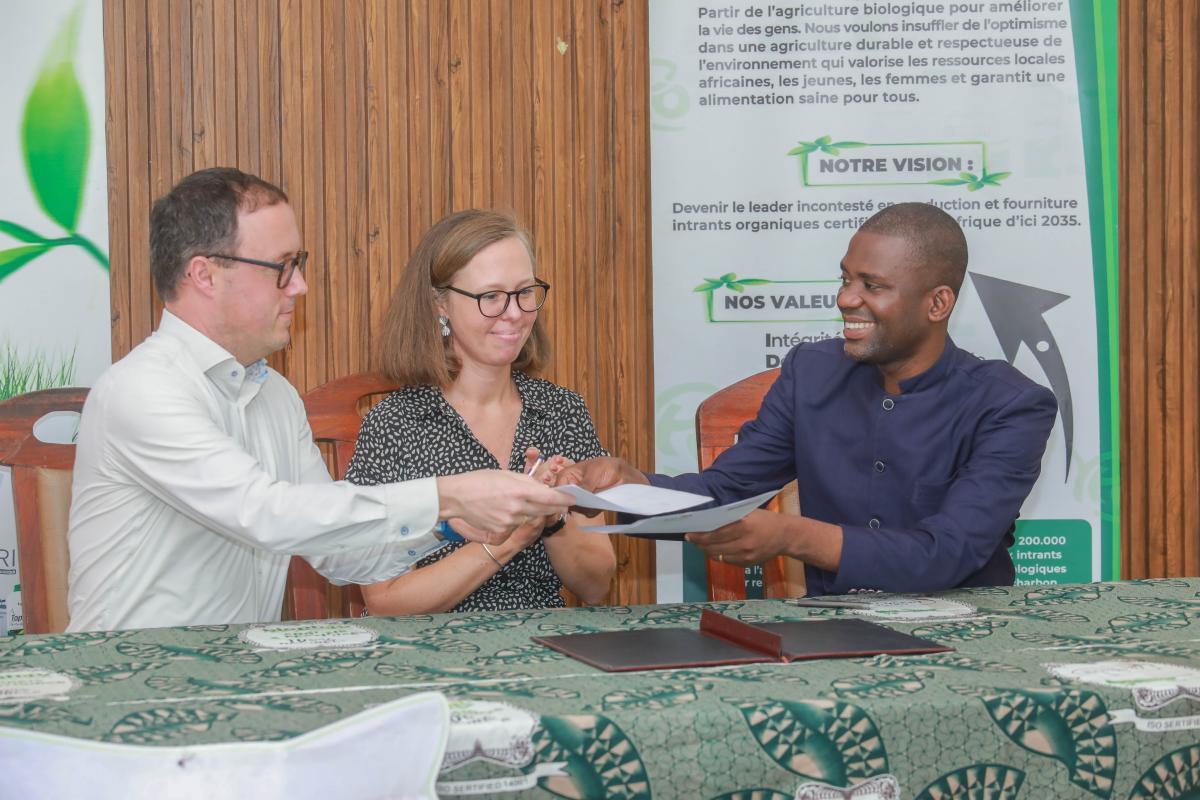
BIOPHYTO : quand l'accompagnement patient crée un champion régional
Reece-hermine ADANWENON | 16/01/2026
15 janvier 2026 à Cotonou, l'émotion était palpable dans la salle de réunion de Biophyto à Allada. Le Dr Gildas Zodomey, fondateur de BIOPHYTO, peinait à retenir ses larmes en signant l'accord de financement de 2,75 millions d'euros avec BIO Invest. Après des années de combat, de doutes et de persévérance, son entreprise franchit un cap historique qui la propulse au rang de champion régional des intrants agricoles biologiques. Un parcours entrepreneurial hors du commun Créée en 2013, BIOPHYTO s'est imposée comme la seule entreprise béninoise à produire et commercialiser des biopesticides certifiés et des engrais organiques. Dans un secteur dominé par les intrants chimiques importés, le pari du Dr Zodomey était audacieux : prouver qu'une agriculture durable, respectueuse de la santé humaine et des écosystèmes, était non seulement possible mais aussi économiquement viable. Les chiffres parlent d'eux-mêmes : un chiffre d'affaires passé de 216 millions FCFA en 2020 à plus de 2 milliards FCFA en 2025, soit une croissance multipliée par 10 en cinq ans. L'accompagnement Enabel : un parcours sur mesure depuis 2019 Derrière cette success story se cache un accompagnement patient, structuré et adapté aux besoins de l'entreprise. Depuis 2019, Enabel au Bénin, à travers son programme de coopération en appui au secteur agricole, a mis en place un dispositif d'appui combinant une diversité d'instruments financiers et techniques. Phase 1 : Structuration et renforcement des capacités (2019-2022): l'accompagnement a débuté par une immersion dans les meilleures pratiques internationales, avec deux voyages d'échange au Ghana pour s'approprier la technique de production du charbon actif enrichi à l'éthylène. Parallèlement, Enabel a travaillé avec BIOPHYTO sur : la mise à jour du plan d'affaires, l'éducation financière et le conseil fiscal, la facilitation d'un crédit fonds de roulement de 20 millions FCFA auprès d'une institution de microfinance partenaire, la mise en place d'une subvention de 46 millions FCFA, adossée à un crédit bancaire de 226 millions FCFA, garanti partiellement par le Fonds National de Développement Agricole (FNDA). Cette première phase a permis à BIOPHYTO de consolider ses fondamentaux et d'améliorer significativement sa performance opérationnelle et commerciale. Phase 2 : Consolidation et transformation (2023-2024) : une fois les capacités suffisamment renforcées, Enabel a accompagné la structuration d'un dossier auprès du fonds belge Kampani pour l'obtention d'un prêt subordonné de 500 000 EUR (328 millions FCFA). Cette étape cruciale a nécessité : la certification des comptes de l'entreprise, la transformation juridique de SARL à SA, le renforcement de la gouvernance d'entreprise. Ce financement a permis à BIOPHYTO d'accroître davantage ses capacités de production et de gagner en crédibilité auprès du secteur financier national et international. Phase 3 : Scaling et expansion régionale (2025-2026) : fort de ces acquis, BIOPHYTO était désormais prêt pour une levée de fonds significative. En 2025, Enabel a facilité la mise en relation avec BIO Invest, aboutissant à la signature, le 15 janvier 2026, d'un accord de financement de 2,75 millions EUR (près de 2 milliards de Fcfa ). Un financement transformateur pour l'avenir Cet investissement permettra à BIOPHYTO de : augmenter massivement sa capacité de production : atteindre 700 000 litres de biopesticides et 5 000 tonnes d'engrais/compost par an s'implanter en Côte d'Ivoire avec une nouvelle unité de production moderniser ses équipements avec intégration de l'énergie solaire créer des emplois et renforcer les partenariats avec les petits producteurs, dont une majorité de femmes La force du modèle Team Belgium Comme le souligne Joris Totté, CEO de BIO Invest : "Ce partenariat s'inscrit dans un continuum belge déjà à l'œuvre. En alignant investisseurs d'impact, ONG et Enabel autour d'objectifs et d'outils complémentaires, nous démultiplions l'impact et sécurisons la montée en puissance d'entreprises transformantes." Cette approche coordonnée entre acteurs belges à savoir Enabel, BIO Invest, Kampani, et l'Ambassade de Belgique à Cotonou constitue un modèle d'efficacité dans la coopération au développement. Chaque acteur intervient au moment opportun avec les instruments adaptés, créant un véritable effet de levier. Des témoignages chargés d'émotion Dr Gildas Zodomey, visiblement ému : "C'est grâce à vous que BIOPHYTO est arrivé à ce niveau. À chaque difficulté, vous étiez là. Quand notre moral faiblissait, vous nous redonniez de l'énergie. Vos appuis techniques, financiers, vos conseils stratégiques, vos encouragements nous ont forgés. Aujourd'hui, je peux dire avec fierté que c'est fait. Je peux clamer haut et fort que la coopération bénino-belge fonctionne parce qu'elle évolue, produit de l'impact, sauve des vies, crée des richesses et pense à l'avenir de l'humanité." Olivier Krins, Directeur d'Enabel au Bénin : "Ce succès n'est pas que celui de BIOPHYTO, mais celui du Bénin tout entier. Cela a été possible grâce à la force de la Team Belgium avec un vrai partenariat entre le Bénin et la Belgique. Aujourd'hui, le Bénin peut être fier d'avoir un champion, mais déjà nous rêvons d'en avoir d'autres, de disséminer cette expérience et de susciter d'autres champions dans les années à venir." S.E. Sandrine Platteau, Ambassadrice de Belgique au Bénin : "BIOPHYTO prouve qu'on peut allier performance économique, santé publique et protection des écosystèmes, tout en valorisant le rôle des femmes rurales. Nous sommes fiers d'accompagner cette dynamique au Bénin et dans la région. Au Bénin, notre action va au-delà de l'exécution d'un programme de coopération. C'est une dynamique qui porte l'entrepreneuriat et l'innovation au cœur des actions pour développer des modèles économiques durables." Un impact qui dépasse les chiffres Au-delà de la performance financière, BIOPHYTO crée un impact socio-économique et environnemental significatif : création d'emplois décents tout au long de la chaîne de valeur, autonomisation économique des femmes à travers les partenariats avec les petites productrices, protection de la santé publique en réduisant l'exposition aux pesticides chimiques, préservation des écosystèmes par la promotion d'une agriculture régénératrice, sécurité alimentaire renforcée par des pratiques durables. Perspectives et ambitions régionales Avec ce nouveau financement, BIOPHYTO ambitionne de devenir le partenaire de référence en Afrique de l'Ouest (Côte d'Ivoire, Sénégal, Togo) pour les gouvernements et le secteur privé dans le domaine des intrants agricoles biologiques. Cette expansion régionale permettra de massifier l'impact et de contribuer à la transformation des systèmes agricoles ouest-africains vers plus de durabilité et de résilience. Un modèle à répliquer L'histoire de BIOPHYTO démontre qu'avec un accompagnement adapté, patient et coordonné, les entreprises africaines peuvent devenir des champions régionaux capables de transformer leurs secteurs. Enabel au Bénin s'engage à répliquer ce modèle d'accompagnement avec d'autres entreprises à fort potentiel, contribuant ainsi à bâtir un écosystème entrepreneurial dynamique et durable au Bénin. La cérémonie de signature du 15 janvier 2026, en présence de l'Ambassadrice de Belgique, du Directeur d'Enabel Bénin, du CEO de BIO Invest et de l'Executive Director de Kampani, marque non seulement l'aboutissement d'un parcours, mais le début d'une nouvelle aventure prometteuse pour BIOPHYTO et pour l'agriculture durable en Afrique de l'Ouest.
-
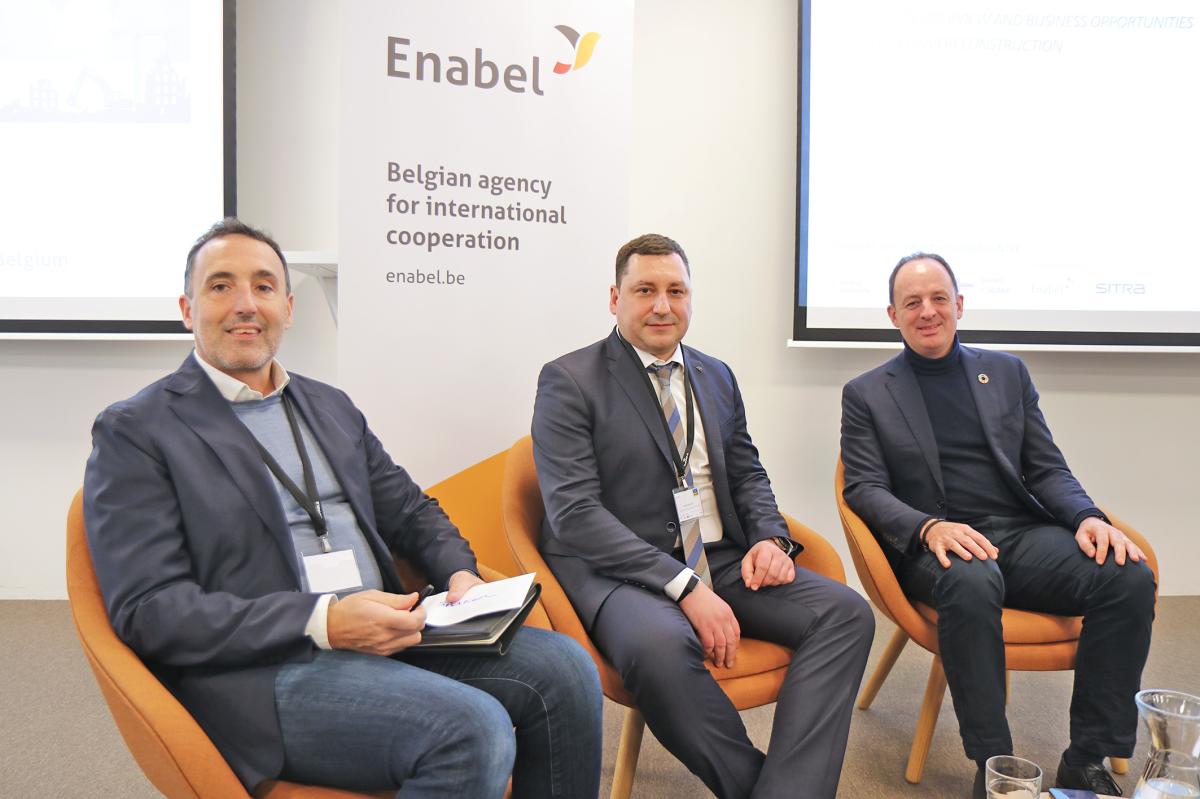
Networking event : Ukraine’s circular recovery and reconstruction
Florence HECQUET | 14/01/2026
War Debris and Hazardous Waste Management in Ukraine: Situation Overview and Business Opportunities for Circular ReconstructionEnabel, through the EU Circular Economy Resource Centre (EU CERC), together with Enabel’s BE-Relieve program in Ukraine and UNEP-Ukraine, organised an exclusive briefing and networking event focused on Ukraine’s circular recovery and reconstruction, with a special emphasis on war debris and hazardous waste management.This event brought together key Ukrainian decision-makers, companies, and sector stakeholders to provide a clear, up-to-date overview of ongoing recovery and reconstruction initiatives, outline current challenges, and highlight emerging business opportunities. The programme will place strong emphasis on interactive discussion, allowing private-sector participants to raise questions, exchange views, and explore concrete, implementable business opportunities.Event and AgendaDate: 22 January 2026Time: 14:00 – 17:00 CETVenue: Enabel Office, Rue Haute 147, BrusselsAgenda:14:00 – 14:30 Opening remarks and introduction Jean Van Wetter, CEO, Enabel Mr. Oleg Bondarenko, Chair of the Parliamentary Committee on Environmental Policy and Nature Management Mr. Ihor Zubovych, Deputy Minister of the Economy, Environment and Agriculture of Ukraine Introductory overview - Pier Carlo Sendei, Senior Programme Officer, UNEP Ukraine 14:30 – 15:15 Presentation "Situation overview and Business Opportunities in War Debris and Hazardous Waste Management for Ukraine’s Circular Reconstruction" Johan de Fraye, Executive Director, Nicole Foundation 15:15 – 16:00 Q&A Session 16:00 – 16 :10 Closing remarks 16 :10 – 17:00 Networking drinksAbout EU CERC EU CERC is a five-year project funded by the European Union and the Ministry of Foreign Affairs of Finland, and implemented by the Sitra, Finnish Innovation Fund and Enabel. The Centre aims to increase the uptake of sound and inclusive circular economy policies and business models, based on peer-to-peer exchanges and partnerships between EU and partner’s country stakeholders. About BE-Relieve BE-Relieve Ukraine is a four-year programme funded by Belgium and implemented by Enabel. It addresses urgent reconstruction needs while fostering long-term systemic change to strengthen Ukraine’s foundation for EU accession. The programme focuses on energy and circular construction, health and social protection, as well as education and employment, contributing to a more resilient and sustainable recovery for the country. About UNEP in Ukraine As the leading global authority on the environment, UNEP brings together international expertise to support Ukraine in responding to war-related environmental emergencies while simultaneously planning for green recovery and sustainable reconstruction.UNEP's work in Ukraine focuses on critical environmental issues including the assessment and management of war debris containing hazardous materials such as asbestos, protection of water resources following the Kakhovka Dam breach, development of resilient and sustainable energy systems, and support for environmental governance frameworks. Join us to connect with Ukrainian leaders, explore strategic opportunities, and contribute to building a sustainable and circular future for Ukraine.
-
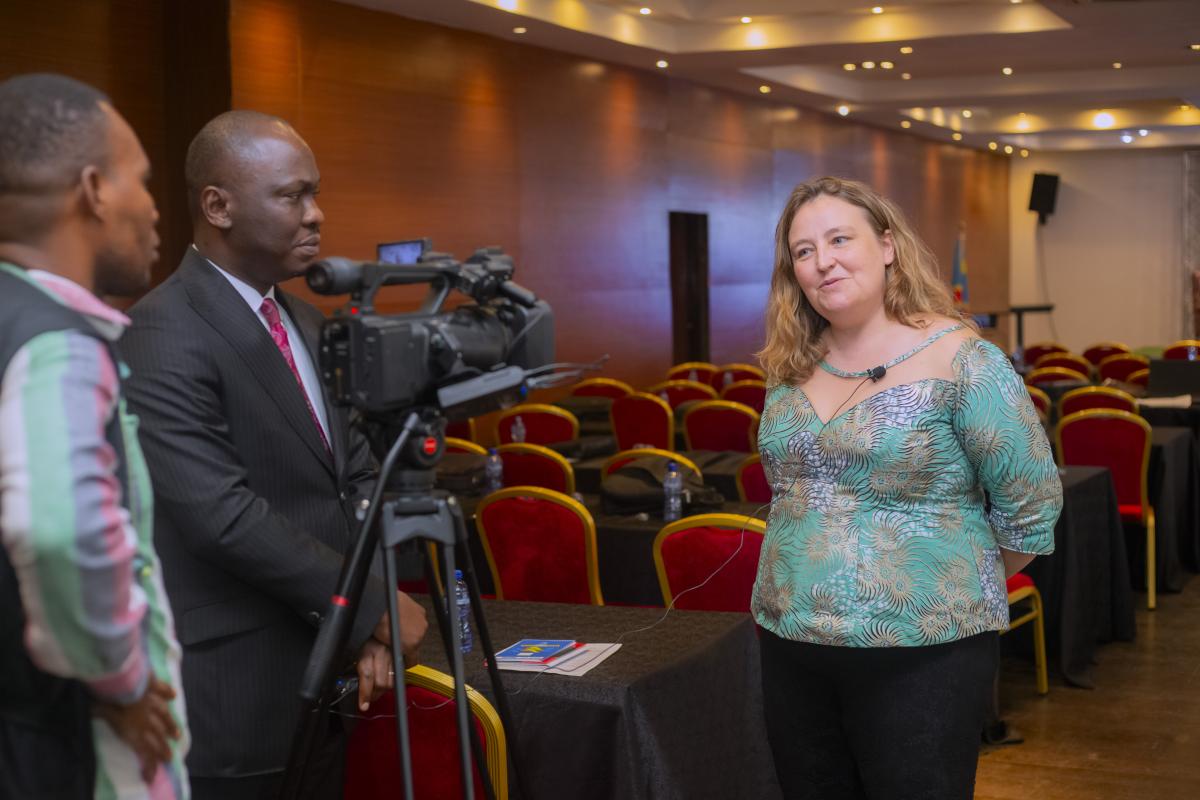
RDC : la formation professionnelle au cœur des réformes pour l’émergence économique
Paola VANGU TSAKALA | 09/01/2026
Une conférence annuelle pour fédérer les acteurs du secteur Le ministère de la Formation professionnelle a lancé le 15 décembre 2025, sa conférence annuelle réunissant les responsables provinciaux et les cadres de l’institution. Cette rencontre visait à présenter les réformes et innovations en cours, à favoriser l’appropriation de la politique sectorielle et à renforcer la collaboration entre les différents acteurs de la formation professionnelle. « Vous êtes ici pour réfléchir à tous ces problèmes. Nous devons bâtir ensemble un ministère de la Formation professionnelle. En un mot, formation professionnelle = préparer quelqu’un à effectuer le travail qui l’attend. Comprendre la formation professionnelle ainsi, c’est corriger les erreurs de l’enseignement pour permettre à quelqu’un de travailler. » S.E. Marc Ekila Likombo, Ministre de la Formation professionnelle et Métiers.Une vision partagée pour des compétences adaptées au marché du travail Pendant cinq jours, les travaux ont permis de consolider une vision commune pour une formation professionnelle efficace, orientée vers l’emploi, la digitalisation et la durabilité. Les échanges ont également renforcé la responsabilisation des acteurs provinciaux dans la mise en œuvre des politiques publiques du secteur. Cette dynamique s’inscrit dans une logique de préparation concrète des compétences requises par le marché du travail, afin de stimuler l’insertion professionnelle des jeunes et de soutenir le développement économique du pays. La formation professionnelle comme levier de transformation économique Pour Katrien Spruyt, Experte en formation professionnelle à Enabel, l’enjeu est clair : « Ce qui est plus important pour le secteur, c’est de se démarquer. Partout dans le monde, la formation professionnelle émerge avec un objectif spécifique : développer des compétences adaptées au monde de l’emploi et devenir un facteur clé de changement économique visible. Ce sont des domaines où de nouveaux types de compétences sont nécessaires, et la formation professionnelle y joue un rôle central. » Un cadre stratégique renforcé par la politique nationale Les travaux ont également permis d’outiller les participants sur les questions liées à la gouvernance, à l’insertion professionnelle et à l’organisation du secteur. Pour rappel, la RDC a adopté en septembre dernier la Politique nationale de la formation professionnelle 2025-2034 (PNFP), un cadre stratégique majeur destiné à dynamiser le secteur et à mieux répondre aux besoins évolutifs du marché de l’emploi.
